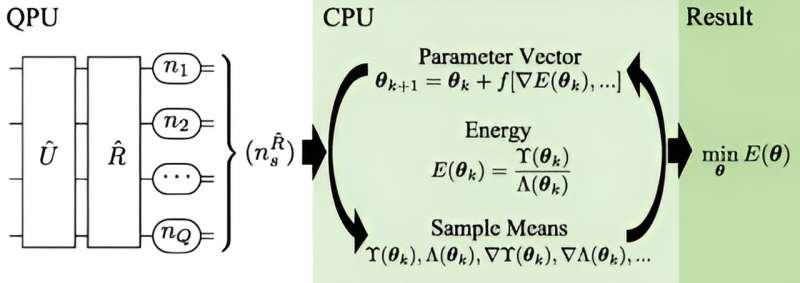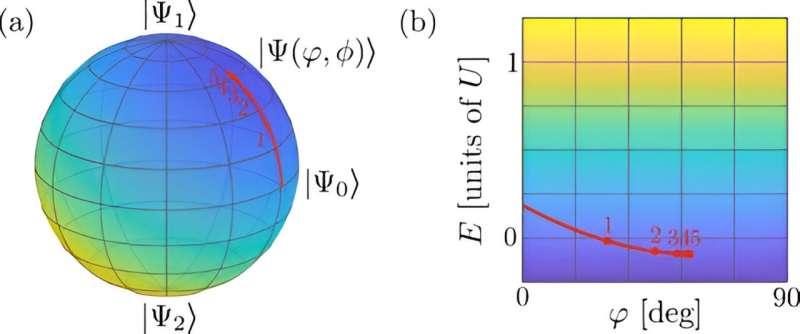This article has been reviewed according to Science X's editorial process and policies. Editors have highlighted the following attributes while ensuring the content's credibility:
fact-checked
peer-reviewed publication
trusted source
proofread
Scientists deliver quantum algorithm to develop new materials and chemistry

U.S. Naval Research Laboratory (NRL) scientists have published the Cascaded Variational Quantum Eigensolver (CVQE) algorithm in a recent Physical Review Research article. The algorithm is expected to become a powerful tool to investigate the physical properties in electronic systems.
The CVQE algorithm is a variant of the Variational Quantum Eigensolver (VQE) algorithm that only requires the execution of a set of quantum circuits once rather than at every iteration during the parameter optimization process, thereby increasing the computational throughput.
"Both algorithms produce a quantum state close to the ground state of a system, which is used to determine many of the system's physical properties," said John Stenger, Ph.D., a Theoretical Chemistry Section research physicist. "Calculations that previously took months can now be performed in hours."
The CVQE algorithm uses a quantum computer to probe the needed probability mass functions and a classical computer to perform the remaining calculations, including the energy minimization.
"Finding the minimum energy is computationally hard as the size of the state space grows exponentially with the system size," said Steve Hellberg, Ph.D., a Theory of Advanced Functional Materials Section research physicist. "Except for very small systems, even the world's most powerful supercomputers are unable to find the exact ground state."
To address this challenge, scientists use a quantum computer with a qubit register, whose state space also increases exponentially, in this case with qubits. By representing the states of a physical system on the state space of the register, a quantum computer can be used to simulate the states in the exponentially large representation space of the system.

Data can subsequently be extracted by quantum measurements. As quantum measurements are not deterministic, the quantum circuit executions must be repeated multiple times to estimate probability distributions describing the states, a process known as sampling. Variational quantum algorithms, including the CVQE algorithm, identify trial states by a set of parameters that are optimized to minimize the energy.
"The key difference between the original VQE method and the new CVQE method is that the sampling and optimization processes have been decoupled in the latter such that the sampling can be performed exclusively on the quantum computer and the parameters processed exclusively on a classical computer," said Dan Gunlycke, D.Phil., Theoretical Chemistry Section Head, who also leads the NRL quantum computing effort.
"The new approach also has other benefits. The form of the solution space does not have to comport with the symmetry requirements of the qubit register, and therefore, it is much easier to shape the solution space and implement symmetries of the system and other physically motivated constraints, which will ultimately lead to more accurate predictions of electronic system properties," Gunlycke continued.
Quantum computing is a component of quantum science, which has been designated as a Critical Technology Area within the USD(R&E) Technology Vision for an Era of Competition by the Under Secretary of Defense for Research and Engineering Heidi Shyu.
"Understanding the properties of quantum-mechanical systems is essential in the development of new materials and chemistry for the Navy and Marine Corps," Gunlycke said. "Corrosion, for instance, is an omnipresent challenge costing the Department of Defense billions every year. The CVQE algorithm can be used to study the chemical reactions causing corrosion and provide critical information to our existing anticorrosion teams in their quest to develop better coatings and additives."
For decades, NRL has been conducting fundamental research in quantum science, which has the potential to yield disruptive Defense technologies for precision, navigation, and timing; quantum sensing; quantum computing; and quantum networking.
More information: Daniel Gunlycke et al, Cascaded variational quantum eigensolver algorithm, Physical Review Research (2024). DOI: 10.1103/PhysRevResearch.6.013238
Journal information: Physical Review Research
Provided by Naval Research Laboratory





















